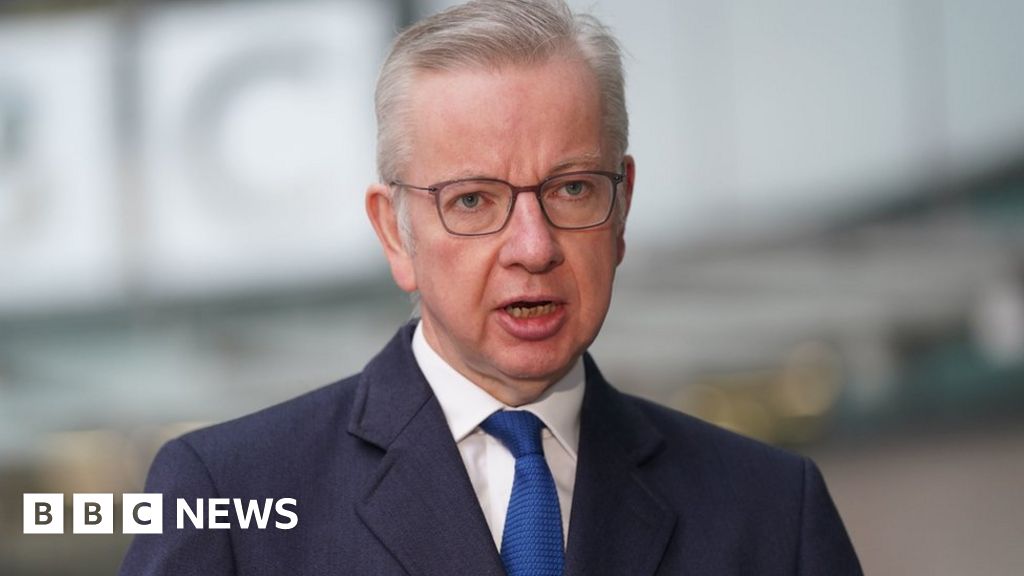- By Sam Francis, Political Correspondent, Christy Cooney
- BBC News
Ministers announced a new definition of extremism that would see certain groups blocked from government funding and meetings with officials.
This applies to groups promoting ideologies based on “violence, hatred and intolerance”, but does not criminalize them.
Communities Secretary Michael Gove said the surge in extremism since the Israel-Gaza war posed a “real risk” to the UK.
Civil rights groups, community groups and members of parliament have criticized recent government statements on extremism.
Jonathan Hall, the government's independent reviewer of terrorism law, warned that the new policy “could not be seen as democratic and could damage the UK's reputation”.
It is unclear which groups the government proposes to classify as extremists, but it has promised to publish a list in the coming weeks and has indicated that Islamists and neo-Nazis will be targeted.
Zara Mohammed, president of the Islamic Council of Britain, told BBC Newsnight that this definition would lead to “unfair targeting of Muslim communities”.
The government has already reduced its involvement with the MCB, Britain's largest Muslim group, and restricted its contact with various departments.
Earlier this month, Chancellor Rishi Sunak stood outside Downing Street and said there were “forces here at home who want to tear us apart”.
Regarding the pro-Palestinian protests that have taken place since the Hamas attacks in Israel, he said: “Recently, our streets have been taken over by small groups that are hostile to our values and do not respect our democratic traditions. There are too many things.”
Prime Minister: “There are forces here in the country who want to tear us apart.''
The new definition, which takes effect Thursday, defines extremism as “the promotion or furtherance of an ideology based on violence, hatred, or intolerance and aimed at:”
- deny or destroy the fundamental rights and freedoms of others;or
- weaken, overturn or replace Britain's system of free parliamentary democracy and democratic rights;or
- Deliberately creating an acceptable environment for others to achieve result (1) or (2). ”
The previous definition, introduced under the Prevent Strategy in 2011, defined extremism as “a violation of fundamental British values, including democracy, the rule of law, individual freedom, and mutual respect and tolerance of different faiths and beliefs.” “vocal or active opposition”.
The government says the new proposal is “narrower and more precise” and will help “clearly articulate” how extremism is “apparent” in behavior.
It also said there was a “high bar” to be classified as an extremist and that the policy would not target people with “personal and peaceful beliefs.”
Unlike terrorist groups, organizations and individuals added to the list are not considered criminal. In return, they will be prohibited from contacting the government and will not be able to receive government funds.
Parallel to the redefinition, a new division, the Counter-Extremism Center of Excellence, was established to collect intelligence and identify extremist groups.
Groups and individuals labeled as extremists have the right to seek reassessment and submit new evidence for review.
If they still disagree, they can challenge the government's decision through a potentially costly judicial review.
Announcing the changes, Mr Gove said: “Our values of inclusivity and tolerance are under challenge from extremists.”
“To protect our democratic values, it is important to strengthen our commonalities and clearly and accurately identify the dangers posed by extremism.”
Critics have warned that the new definition is too broad and could exacerbate communal tensions and expose ministers to legal challenges.
“All attempts to update the definition of extremism have failed because it is never clear what we are trying to prevent by defining extremism,” Hall told the BBC. Ta.
“What we're seeing is … a movement away from people who are doing bad things and toward people who are thinking bad things and have bad ideologies.”
Azhar Qayyum, chief executive of Muslim Engagement and Development (MEND), said: “Delegitimizing legitimate dissent in this way undermines the principles of liberal democracy.'' “We have given a notice.”
“tinkering”
Announcing the new definition, Mr Gove faced questions about whether the Conservative donor's alleged comments about Diane Abbott would be an example of what kind of cases the new counter-extremism unit would consider.
Frank Hester reportedly said the congressman made him want to “hate all black women” and that she “should be shot.”
He acknowledged that he had made “rude” comments about her and apologized, but insisted his comments had “nothing to do with her gender or the color of her skin.”
Mr Gove told BBC Radio 4 that the comments were “racist” and “horrifying”, but the new team's role would not be to evaluate individual comments, but to review the organization's “ideology”. He added that this is true.
Labour's deputy leader Angela Reiner, who is also shadow communities secretary, said extremism was a “serious problem that requires serious action” and “just tinkering with new definitions is not enough”.
“The government's counter-extremism strategy is nine years out of date and has repeatedly failed to define Islamophobia,” she said.
In an open letter published in the Guardian newspaper on Sunday, former home secretary Priti Patel, Sajid Javid and Amber Rudd called on the Conservatives and Labor to “build a common understanding of extremism and strengthen the national “We urge them to work together to build a strategy to stop it that will stand the test of time.” No matter which party wins the election, the moment remains the same. ”
“In the run-up to the general election, it is especially important that that agreement holds and that no party exploits this issue to seek short-term tactical advantage,” they said.
Brendan Cox, husband of slain MP Jo Cox and founder of Survivors Against Terrorism, who also signed the letter, said the new definition was “not the scorched-earth policy we feared a few weeks ago.” said.
He added that while it had “some constructive elements”, the government's approach had been “mismanaged and mishandled”.


